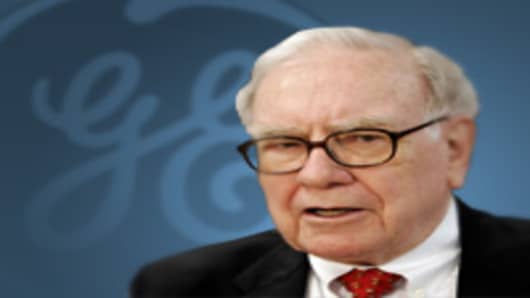Warren Buffett's latest purchase not only diversifies his Berkshire Hathaway holding company, but may even position it for a rebound in the U.S. economy and its sinking housing market.
On Christmas Day, Berkshire agreed to pay the Pritzker family of Chicago $4.5 billion for 60 percent of Marmon Holdings, which makes such things as railroad tank cars, plumbing pipes, metal fasteners, and wiring and water treatment products used in residential construction.
Berkshire plans to buy the rest of Marmon by 2014, for a price based on future earnings.
The purchase is Berkshire's largest acquisition outside insurance. Berkshire's insurance units include auto insurer Geico and reinsurer General Re.
"Marmon is a classic Buffett opportunity," said Frank Betz, a principal at Carret/Zane Capital Management in Warren, N.J., which invests $800 million and owns Berkshire stock. "Many of its businesses dovetail into worldwide requirements for infrastructure, where American industry will be a long-term beneficiary."
Buffett generally favors companies with easy-to-understand businesses, strong management, consistent earnings power, good returns on equity, and little or no debt.
The Marmon purchase follows two other major purchases by Omaha, Nebraska-based Berkshire in the capital goods sector.
Last year, Berkshire bought 80 percent of Israel's Iscar Metalworking for $4 billion. Then in 2007, it amassed a 17.2 percent stake in railroad operator Burlington Northern Santa Fe. That stock is worth about $5.1 billion. Berkshire's own market value tops $210 billion.
Flooring It
The Marmon purchase took less than two weeks to complete. A Goldman Sachs & Co banker delivered documents to Buffett as he prepared to fly home from a Dec. 11 fund-raiser in San Francisco for Democratic Sen. Hillary Clinton, a U.S. presidential candidate, people familiar with the matter said.
It also came amid widespread expectations by economists that the U.S. economy will slow significantly through this winter, and faces a growing threat of a near-term recession.
Buffett, who has revealed several non-U.S. investments over the last two years, isn't worried.
In an interview on CNBC's "Squawk Box" Wednesday, the 77-year-old said "the test will not be whether the stock market likes it today or tomorrow," but how Marmon performs "in 10 or 20 years ... It's a very large bet on America over a long period of time."
Noting that Berkshire is already a conglomerate of more than 70 companies, he added: "You can call us a conglomerate squared now."
Buffett and Thomas Pritzker, Marmon's chairman, were unavailable for further comment.
Marmon's name derives from the Marmon Motor Car, which produced the Wasp car that Ray Harroun used to win the first Indianapolis 500 race in 1911.
It said its more than 125 units employ about 21,000 people, and in 2006 posted operating income of $794 million on revenue of $6.99 billion. Marmon operates mainly in North America, Europe and China, the world's fastest growing major economy.
Berkshire's businesses employ about 220,000 people. They generated a $10.27 billion profit on revenue of $90.2 billion from January to September.
Among its manufacturing holdings are flooring maker Shaw Industries Group and mobile home company Clayton Homes.
Berkshire also has exposure to housing through Benjamin Moore paints and Johns Manville roofing and insulation.
Financial Services Targets for Buffett?
The initial $4.5 billion Marmon payment will consume less than 10 percent of Berkshire's $47.08 billion of cash holdings. Buffett retains the power to make the giant acquisition he has said he covets, perhaps one worth $60 billion.
Berkshire has long been rumored as a potential investor in financial services companies battered by the global credit crunch. Defaults by homeowners and credit card users are expected to mount in 2008, hurting industry profitability.
In the CNBC interview, Buffett said "we haven't seen any (investments) we want to move on. That doesn't mean we won't in the next six months."
Buffett has made some unexpected bets in the recent past.
In 2005, Berkshire had made a $21.8 billion bet that the U.S. dollar would fall. Berkshire later unwound that successful bet as it found other non-U.S. investments, including Iscar.
And in 2002, Buffett bought distressed junk bonds of Level 3 Communications, even as many other investors wrongly bet the telecommunications provider would go bankrupt.
Betz, who has played bridge with Buffett, said the billionaire might soon take a liking to debt tied to "subprime" home loans for people with weak credit, saying prices "could be hammered down so severely that it can become compelling."
He concluded: "Buffett will continue to surprise everybody, and people will say, 'Gee, why didn't I think of that?"'



